- Home
- Peter Swanson
Before She Knew Him
Before She Knew Him Read online
Dedication
To three generations of the Galleranis
(but especially to Meghan)
Contents
Cover
Title Page
Dedication
Part 1: Witness Chapter 1
Chapter 2
Chapter 3
Chapter 4
Chapter 5
Chapter 6
Chapter 7
Chapter 8
Chapter 9
Chapter 10
Chapter 11
Chapter 12
Chapter 13
Chapter 14
Chapter 15
Chapter 16
Chapter 17
Chapter 18
Chapter 19
Chapter 20
Chapter 21
Chapter 22
Richard
Part 2: From the Living to the Dead Chapter 23
Chapter 24
Chapter 25
Chapter 26
Chapter 27
Chapter 28
Chapter 29
Chapter 30
Chapter 31
Richard
Part 3: Brothers Chapter 32
Chapter 33
Chapter 34
Chapter 35
Chapter 36
Chapter 37
Chapter 38
Chapter 39
Chapter 40
Chapter 41
Chapter 42
Acknowledgments
About the Author
Also by Peter Swanson
Copyright
About the Publisher
Part 1
Witness
Chapter 1
The two couples met at a neighborhood block party, the third Saturday in September.
Hen hadn’t wanted to go, but Lloyd convinced her. “It’s just down the street. If you hate it, you can turn around and come straight back.”
“That’s exactly what I can’t do,” Hen said. “I need to stay at least an hour or else people will notice.”
“They really won’t.”
“They really will. I can’t just look around at my new neighbors, then turn and leave.”
“I’m not going if you don’t go.”
“Fine,” Hen said, calling his bluff, knowing that he’d go alone if pressed.
Lloyd was silent for a moment. He was in front of the living room bookshelf, rearranging. They had closed on a single-family in West Dartford at the beginning of July, during one of the worst heat waves in Massachusetts history. Two months later, the weather had cooled, and Hen was beginning to feel that the house was theirs. The furniture was all in the right rooms, paintings were hung on the wall, and Vinegar, their Maine coon, had started to occasionally come up from the basement where he’d been hiding.
“What if I ask you to come with me as a favor?”
Favor was an unacknowledged code word between them, a gambit Lloyd usually used only when Hen was unwell. In the past, it was how he sometimes roused her from the bed in the morning.
“Don’t do it for you. Do it for me. It’s a favor.”
She occasionally resented the word and the way Lloyd used it, but she also understood that it was reserved for times when Lloyd thought it was important. Important for both of them.
“Okay. I’ll come,” she said, and Lloyd turned from the bookshelf, smiling.
“I apologize in advance if it’s awful,” he said.
Saturday was sunny and blustery. Sporadic gusts of wind ripped at the plastic tablecloth, weighted down with bowls of pasta salad, chips, endless hummus and pita. Dartford was a well-heeled commuter suburb forty-five minutes from Boston, but West Dartford, separated from the rest of the town by the Scituate River, had smaller houses spaced closer together, all built for the workers from a long-defunct mill that had recently been turned into artist studios. The converted mill was one of the reasons that Lloyd and Hen had picked this location. Hen could have her own studio that was walking distance from home, and Lloyd could take the commuter rail—the station was also walking distance—into Boston for his job. They’d still need only one car, the mortgage was less than what they’d been paying in Cambridge, and they’d practically be in the country, away from it all.
But standing at the block party, dominated by young hip couples, almost all with children, it didn’t feel all that different from their previous neighborhood. A woman named Claire Murray—the same woman who had hand-delivered the block party invite—introduced Hen and Lloyd around. Invariably, conversations broke out along gender lines: Hen found herself explaining her name—“short for Henrietta”—at least three times and that she was a full-time artist another three times—and told two of the women that, no, she didn’t have any children yet. Only one, a darkly freckled redhead wearing a T-shirt with the logo of a preschool, asked Hen if she planned on having children. “We’ll see,” Hen lied.
It was a relief when, after eating some pretty delicious pasta salad and half a dry cheeseburger, Hen and Lloyd found themselves back together, conversing with what appeared to be the only other childless couple at the party, Matthew and Mira Dolamore, who turned out to live in the Dutch Colonial immediately next to theirs.
“They must have been built at the same time, don’t you think?” Lloyd asked.
“All the houses on this street were,” Matthew said, rubbing at the space between his lower lip and his chin. When he took his finger away, Hen saw that he had a scar there, like Harrison Ford. He was handsome, Hen thought, not Harrison Ford handsome, but good-looking in the sense that all his features—thick brown hair, pale blue eyes, square jawline—were the features of a good-looking man, yet they all added up to something less than their parts. He stood stiffly, a dress shirt tucked into unstylish high-waisted jeans. He reminded Hen of a mannequin, with his broad shoulders and his large, knuckly hands. Later, when they all had dinner together, she would decide that he was one of those harmless, cheery men, the type of person you’d be happy to see but would never think of when they weren’t around. Much later she’d realize how wrong that first impression was. But on that bright Saturday afternoon, Hen was just happy that Lloyd was back by her side, conversing, and she wouldn’t have to fend for herself.
Mira, about half the size of her tall husband, moved in closer to Hen. “You don’t have children, either,” she said, more a statement than a question, and Hen realized that their new neighbors had undoubtedly spied on them as they moved in back in July. It was strange that they hadn’t come over and introduced themselves.
“No, no children.”
“I think we’re the only couples on this street who don’t.” She laughed nervously. Hen decided that Mira was the physical opposite of her husband, that her features—a slightly too large nose, a low hairline, wide hips—added up to someone far more attractive than her husband.
“What do you do?” Hen asked, immediately annoyed at herself for instantly relying on that particular question.
The four talked for another twenty minutes or so. Matthew was a history teacher at a private high school three towns over, and Mira was a sales rep for an educational software company, which meant, she said several times, that she spent more time traveling than she did at home. “You’ll have to keep an eye on Matthew,” she said. “Tell me what he gets up to when I’m away.” The nervous laugh again. Hen should have hated her, but somehow she didn’t. Maybe the move really had mellowed her, but it was more likely the effect of her current meds. Another burst of wind, colder now, came down the street, rustling the still-green trees, and Hen pulled her cardigan around her body and shivered.
“Cold?” Matthew asked.
“Always,” Hen said, then added, “I think I might head on back . . .”
&
nbsp; Lloyd smiled at her. “I’ll come with you,” he said, then turned to Matthew and Mira. “Believe it or not, we’re still unpacking. Nice meeting you both.”
“Nice meeting you, Lloyd,” Matthew said. “And you, too, Hen. Is it short—”
“Henrietta, yes, but no one, except for my birth certificate, has ever called me that. It’s always been Hen.”
“Let’s get together sometime. Maybe cook out, if it’s not too late.” This was from Mira, and they all agreed, in vague responses that made Hen decide that it was never going to happen.
So Hen was surprised when, a week later, Mira ran out from her front door as Hen was walking home from her studio.
“Hen, hi,” Mira said.
As usual, after spending an afternoon working, Hen felt spacey, in a good way. “Hi, Miri,” she responded, realizing right away that she’d gotten the name wrong. Her neighbor didn’t correct her.
“I was going to drop by this evening but I saw you coming down the street. Can you come over for dinner this weekend?”
“Um,” Hen said, delaying.
“Friday or Saturday, it doesn’t matter,” Mira said. “Sunday even works for us.”
Hen knew she wasn’t going to get out of this, especially now that three possible nights had been offered up. She and Lloyd had no specific plans that weekend, so she picked Saturday night and asked what they could bring.
“Just yourselves. Yay. Is there anything you can’t eat?”
“No, we eat everything,” Hen said, neglecting to tell her about Lloyd’s phobia of any meat that came attached to a bone.
They settled on seven o’clock on Saturday, and Hen informed Lloyd when he came home that night.
“Okay,” he said. “New friends. You up for it?”
Hen laughed. “Not really, but it will be nice to have a meal cooked for us. We’ll be dull and they’ll never invite us back.”
She and Lloyd arrived exactly at seven, armed with a bottle of red and a bottle of white. Hen wore her green-checked dress with tights on underneath. Lloyd, who’d showered at least, was wearing jeans and a Bon Iver T-shirt that he sometimes wore when he went running. They were taken to the living room—the layout was identical to theirs—where they all sat around a low coffee table, arrayed with enough appetizers to feed a small party. Hen and Lloyd sat on a beige leather couch, while Matthew and Mira sat in matching chairs. The room was very white and sterile, incredibly clean. There were interesting prints hanging on the walls, but Hen thought she recognized them from Crate and Barrel.
They made small talk for about fifteen minutes. Hen was aware that they hadn’t been offered a drink—was this a nondrinking house?—but didn’t particularly mind, except she was thinking of Lloyd. But just as Mira was asking if Hen was going to be part of the upcoming Open Studios, Matthew stood and said, “Can I get anyone a drink?”
“What are the choices?” Lloyd asked, a little too eagerly.
“Wine, beer.”
“I’ll have a beer,” Lloyd said, while Hen and Mira each asked for a glass of white wine.
Matthew left the room, and Mira asked again about Open Studios.
“I don’t know,” Hen said. “I just got my space set up, like yesterday. It seems strange to suddenly have people parade through.”
“You should do it,” Lloyd said.
“Yeah, you should,” Mira said.
“Have you been to Open Studios before?” Hen asked Mira.
“Yeah. Every year we’ve been here. I go, anyway. Sometimes Matthew does. It’s fun, you should definitely do it. You might even sell something. That’s where I bought these prints.”
Mira indicated the framed prints on the wall, and Hen felt bad for thinking they’d come from a furniture store. Matthew returned with the drinks, Hen noticing that he’d brought a can of ginger ale for himself.
“Tell us about your art,” Mira said.
It was not Hen’s favorite thing, explaining her profession, but she did her best, and Lloyd, always her champion, jumped in and took over. Since college, Hen had been a printmaker, first in woodblocks and later using copper or zinc plates. For years, she created works of pure imagination: grotesque, surreal tableaus, usually with a caption. These illustrations were made to look like they came from books, often terrifying children’s books that didn’t exist except in her mind. She’d been fairly successful all through her twenties, selected for several group shows and even profiled in a New England arts magazine, but she’d always had to supplement her income by working in art supply stores and sometimes as a framer for a prominent Boston painter in the South End. All that changed when she’d been approached by a children’s book author to create actual illustrations for the first chapter book in a proposed fantasy series. She’d taken the job, the book had done well, and that had led her to an agent, and now she was a full-time children’s illustrator who only occasionally created an original piece of art. She didn’t mind. Secretly, she felt happy these days to be told what her compositions should be. Her current cocktail of meds, which included a mood stabilizer, an antidepressant, and something that apparently boosted the antidepressant’s effects, had kept Hen’s bipolar disorder from rearing its ugly head going on two years, but she did feel that it had also removed all of her creative impulses. She could still do the pieces—still loved the work, really—but rarely had an idea these days for something original. Not that she told any of this to Mira and Matthew. Mira was mostly interested in the fantasy books, since she’d heard of them, and was promising to buy the first in the series. Matthew asked her several questions about her artistic process, leaning in and listening intently to her answers.
They eventually moved to the dining room, where the food had been set up on warming plates on a sideboard: mashed potatoes, drumsticks in a bright yellow sauce, a green salad.
“This was how my grandparents used to serve food,” Hen said. “On a sideboard.”
“Where are they from?” Mira asked.
Hen explained that her father was British and her mother American and how they’d moved back and forth between Bath in England and Albany in New York during her childhood.
“I thought you had an accent,” Mira said.
“Really? I thought I didn’t.”
“It’s mild.”
“Are you from . . . ?”
“I’m from California, but my parents were both from the north of England, by way of Pakistan, and they acted very British. All our meals, including breakfast, were served from a sideboard in the dining room.”
“I like it,” Hen said.
Conversation at dinner was fine but never really kicked into anything lively. It was a lot of talk about their respective jobs, the neighborhood, the ridiculously overpriced housing market. Whenever Matthew spoke it was to ask more questions, usually of Hen. She realized, after he’d asked her if she’d survived the block party, that he was fairly perceptive. Lloyd, hoping to turn the conversation to sports, asked Matthew if he did any coaching at Sussex Hall. Matthew said he didn’t (“the only sport I was ever good at was badminton”). Hen, who, right out of college, had spent a disastrous three months trying to teach a preschool art class, asked him if he found teaching to be emotionally draining, and he said that the first two years were hard. “But now I love it. I love the students, learning about their lives, watching them change so much from freshman year to senior year.” Hen could sense Lloyd, steadily working his way through several glasses of wine, stifling yawns.
After dessert—a warm rice pudding with raisins and cardamom—Hen said that they should be going, that they were driving the next morning to Lloyd’s parents’ house. True, but they weren’t leaving until late morning, at the earliest.
The two couples stood in the front hallway, Hen saying again how much she loved the way they’d decorated the house.
“Oh, we should give you a tour,” Mira said. “We should’ve done it earlier.”
Surprisingly, Lloyd agreed, and Mira took them through the renovated kitc
hen, showed them the deck they’d added off the back of the house, and then brought them both into Matthew’s downstairs office. It was a room so different from the light colors and clean lines of the rest of the house that Hen felt it was like walking into an entirely different house, maybe even a different time. The walls were papered in a dark green with a faint crosshatch pattern, the floor was covered in a well-worn Persian, and the room was dominated by an enormous glass-fronted cabinet filled with books and framed photographs. There was one small desk in the study, with a leather-padded chair; the only other place to sit was a corduroy sofa. Nothing in the room seemed remotely modern, and every available space was taken up by knickknacks or framed pictures, all in black and white. Hen, drawn to small objects and anything old, took two steps into the room and couldn’t stop herself from saying, “Oh.”
“This is all Matthew,” Mira said.
Hen turned back and smiled, noticing that Matthew, who’d been doing the dishes through most of the tour, now stood nervously in the doorway. Hen felt awkward, like they were being shown something far more private than a study. “I love it,” she said. “So many interesting things.”
“I’m a collector,” Matthew said. “Mira is the . . . what’s the opposite of collector? A thrower-outer?”
There was a fireplace, and Lloyd was asking if it worked as Hen scanned the objects along the mantel. It was an odd assortment—a small brass snake, wooden candlesticks, a miniature portrait of a dog, an illuminated globe, and, in the middle, a trophy, the figure of a fencer in mid-lunge on top of its silver pedestal. For one terrible moment Hen thought she might faint. Her vision blurred, and her legs felt as though water were rushing through them, then she gathered herself. It’s probably just a coincidence, she said to herself, stepping forward to look at the inscription on the base of the trophy. third place épée, she read, then, in smaller script, it looked like junior olympics and a date she couldn’t make out. She didn’t want to get too close to it. She turned and, in what she hoped was a normal voice, asked Matthew, “Do you fence?”

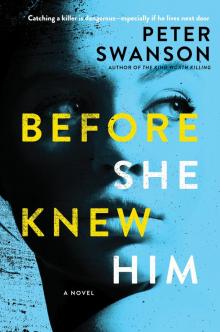 Before She Knew Him
Before She Knew Him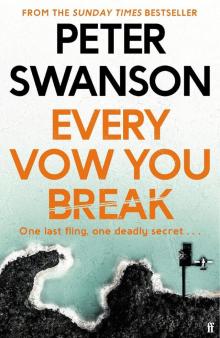 Every Vow You Break
Every Vow You Break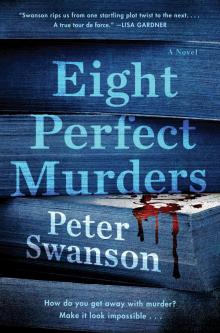 Eight Perfect Murders
Eight Perfect Murders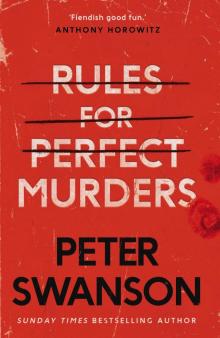 Rules for Perfect Murders
Rules for Perfect Murders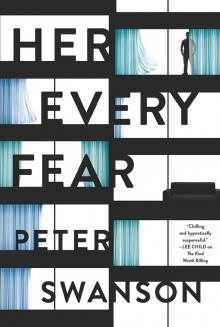 Her Every Fear
Her Every Fear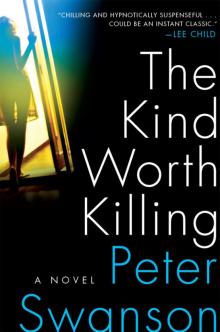 The Kind Worth Killing
The Kind Worth Killing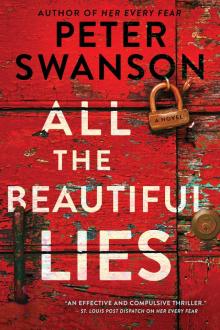 All the Beautiful Lies
All the Beautiful Lies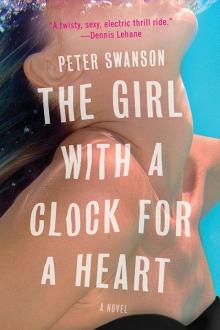 The Girl with a Clock for a Heart: A Novel
The Girl with a Clock for a Heart: A Novel